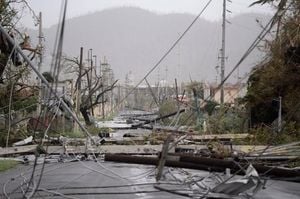A recent fire involving a Mercedes-Benz electric vehicle (EV) has prompted South Korea to undertake significant changes to its EV safety regulations. The incident, which occurred this past August at an underground parking facility in the city of Incheon, drew widespread attention and concern, as investigations were unable to swiftly determine the underlying cause of the fire. Now, the South Korean government is taking proactive steps to revamp its policies aimed at bolstering the safety of electric vehicles to protect consumers and address the growing unease surrounding EVs.
The blaze ignited debates on consumer safety and the reliability of EV technology, especially as the popularity of electric vehicles soars amid global calls for greener transportation alternatives. The intensity of the fire resulted not only in property damage but also raised serious fears about battery safety. Over the past few months, the South Korean government has unveiled a series of regulations intended to prevent similar incidents from occurring.
One of the standout features of this new safety overhaul is the government's mandate requiring automobile manufacturers to disclose the specific brands of batteries used in their electric vehicles. This measure aims to provide consumers with more transparency about the components utilized in their vehicles and create accountability. Consumers now have the right to know what they're getting, much like reading the nutrition label on food products.
Another significant aspect of the revised guidelines involves amplifying the scope of safety inspections for existing electric vehicles. This expanded focus means more thorough checks will be conducted to identify potential safety issues before they lead to catastrophic events.
To address battery concerns directly, the South Korean government has also launched a pilot project for state-run safety certifications. Initiated in mid-October, this project includes participation from major players like Hyundai Motor Co., Kia Corp., and LG Energy Solution Ltd., among others. Under this framework, government agencies such as the Korea Automobile Testing & Research Institute will evaluate and certify EV batteries before they are installed. Previously, there was no requirement for third-party safety testing, leaving ample room for unregulated practices.
While the fire incident itself was devastating, its aftermath is leading to constructive dialogue among industry stakeholders and government officials. Critically, the increased scrutiny may help restore consumer confidence, which could wane if safety issues go unresolved, particularly at this juncture when EV adoption is advancing rapidly.
Industry experts suggest the changes are overdue. The rapid rise of electric vehicle sales globally has been accompanied by concerns about hazards associated with lithium-ion batteries, including fire risks and incidents of explosions. Reports of EV fires, which have received amplified media coverage, contribute to public hesitancy about transitioning to electric vehicles. South Korea’s new regulations may pave the way for establishing much-needed trust among potential buyers.
Mercedes-Benz itself has initiated internal actions to reevaluate safety procedures and battery technologies after the incident. The company's commitment to enhancing safety standards follows trends among various manufacturers who are taking proactive measures to prevent negative publicity linked to EV-related incidents.
The new regulations and initiatives mark South Korea's determination to prioritize consumer safety and embrace sustainable technologies responsibly. Critics of the EV industry have highlighted the urgent need for strict oversight, particularly as the sector continues to grow. A modernized regulatory framework is deemed necessary to uphold safety standards and boost consumer confidence.
This updated approach should ideally set the tone for discussions surrounding future advancements in electric mobility and autonomy. With the rise of battery-electric vehicles, hybrid systems, and other sustainable transport solutions, regulatory environments around the globe must adapt. Leaders and regulatory bodies must remain vigilant to the rapidly-evolving industry, balancing innovation with safety.
Authorities' commitment to enforcing battery certifications and conducting thorough vehicle checks does not only represent progress for consumers but also bolsters South Korea's reputation as a leader in technological advancement and innovation. It is hopeful to see nations willing to learn from unfortunate events and implement regulations aimed at preventing occurrences like the tragic Mercedes-Benz fire. The future of transportation lies not only in advancing technology but safeguarding the people who use it. South Korea's proactive stance can serve as a blueprint for other nations seeking to balance electrification with safety.



